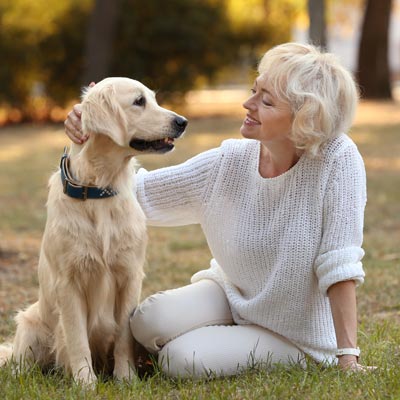Last Updated on 3 years by Dr Alisha Barnes

Just like humans, our dogs age. Oftentimes, this is a slow and gradual process, especially when we’ve had long relationships with our furry friends and acquired them at a relatively young age. For many pet owners the “seven year rule” is the metric that is used to determine their dog’s age. Veterinarians and pet chiropractors caution against this metric, however, because it isn’t truly an accurate representation of your dog’s age, health, or physical and mental abilities.
Typically, large dogs age faster than small dogs. The rate at which a dog ages is determined by their weight and size, with larger dogs aging faster than smaller dogs. The best person to evaluate your dog’s age is a veterinarian, who will use a wide breadth of metrics to assess what your dog’s age is.
Keep in mind that age isn’t necessarily indicative of vitality or ability—each individual dog is different, and some dogs tend to show less signs of the wear and tear of age than others, while others show more.
Your veterinarian can determine your dog’s age and health by markers like a blood panel, fur color and condition of teeth, size and agility, and overall temperament, energy level, and vitality. If you already have a general idea of your dog’s age, or simply want to know how to support them better in their current stage of life, read on.
The Puppy Stage
Puppies tend to have very high levels of energy, and lots of enthusiasm! Puppies are in the process of exploring the world and investigating the many sights, sounds, and scents that they encounter. When unleashed in an indoor or outdoor environment, a puppy is likely to explore the entire space, biting, licking, sniffing, and chewing on everything within their reach.
Puppies can be more difficult to train than adult dogs at the onset of their training, primarily due to having a shorter attention span than older dogs. That being said, puppies are highly adaptable, both physically and mentally, and will typically retain training with regular reinforcement.
Like children, puppies have a developing brain, and can have challenges with impulse control. As aforementioned, this can contribute to initial challenges in completing training and regulating behavior, but these difficulties normally decrease as your puppy becomes older.
The Adult Stage
Adult dogs usually have a moderate amount of energy, which may manifest differently depending on your dog’s personality and health. A healthy adult dog will enjoy engaging in physical activity, become excited for their favorite activities (like walks or visits to the park), and handle new environments relatively well (barring any anxiety or outlying mood disorders).
Adult dogs are relatively spry, both physically and mentally—they are able to retain learned information well and acquire new information and training easily. Again, this varies by personality and health, but healthy adult dogs are typically adaptable, keen to engage with their preferred people or other animals, and inquisitive.
Adult dogs are also physically adaptable—they’re comfortable in a variety of environments, on various surfaces (the floor may be equally preferable to the couch, for instance), and in most movements and activities.
The Senior Stage
Senior dogs are similar to adult dogs, but in most ways, slower and less mobile.
While a healthy senior dog’s mood tends to remain consistent with their mood as an adult, senior dogs that are in pain or unhealthy may exhibit symptoms of discomfort or distress. This can manifest as less excitement: less wagging tail, less movement, and less enthusiasm for favorite activities.
Senior dogs often prefer soft and comfortable, supportive surfaces like beds and furniture to hard surfaces like floors, concrete, or grass.
If your senior dog no longer gets excited about engaging in physical activity, or seems to stop engaging in physical activity prematurely, this is likely because they are experiencing the normal degeneration which occurs with age, or they may be experiencing pain.
Age-related degeneration occurs all over the body, for example: yellowing teeth or tooth decay, arthritis in bones and joints, the deterioration of the senses (loss of sight, smell, sound, and taste), and incontinence.
Pain, however, occurs for a variety of reasons. With age, it’s often the result of arthritis, bone spurs, herniated discs, or other age-related conditions. Sometimes, pain symptoms or pain-related behavior can be the result of an injury or accident, in which case immediate medical veterinary care is highly advised.
Professional Care at Every Stage
A wonderful way to support your dog’s health, irrespective of their life stage, is by seeking regular professional care.
Your veterinarian is able to keep an eye on your dog’s health markers and ensure that your furry friend is free from disease, while a professional pet chiropractor is able to help support the highest possible baseline of health for your dog.
Dr. Alisha Barnes of Tails Animal Chiropractic Care in Boulder, Windsor, and Fort Collins, Colorado is delighted to offer health-supporting care to your dog at any age. Tails Animal Chiropractic Care is an advocate of creating ideal health conditions for all animals, and has helped thousands of dogs recover mobility, vitality, and comfort in their bodies.
If you would like to take an impactful and powerful step in supporting your puppy, adult, or senior dog’s health, book your appointment today!
